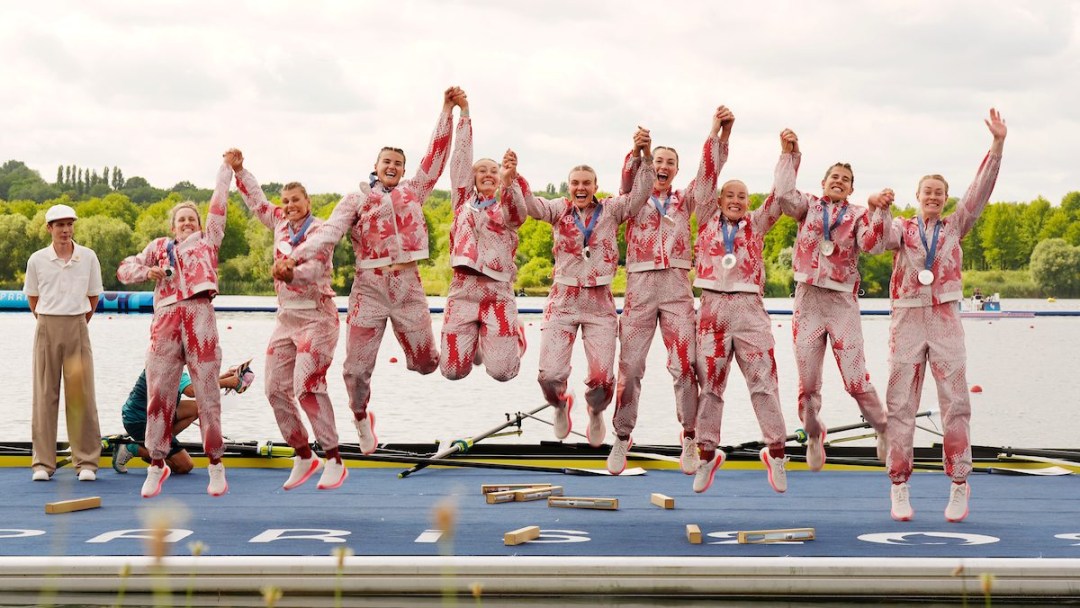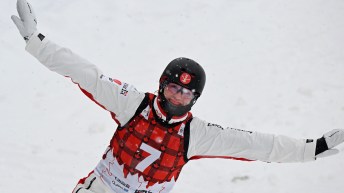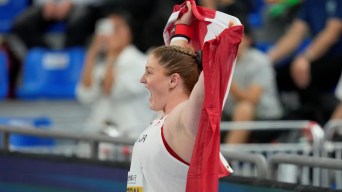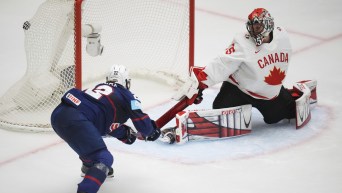First with the head, then with the heart: Team Canada’s women’s eight shares their journey to the Olympic podium
As Team Canada’s women’s eight rowing crew awaited the start of the Paris 2024 Olympic final, coxswain Kristen Kit shared a last message with the team, one that she’d scribbled on a piece of electrical tape to bring into the boat with them.
First with the head, and then with the heart.
Each athlete took what they needed from that. To first-time Olympian Maya Meschkuleit it meant that “you go as hard as you can with all your technique, and then when your technique isn’t enough, you go with your heart—you think about all the hours you’ve put in. You think about your family and your supporters and the girls in the boat and you find that extra gear. You find that 1%.”
And that 1% straight from the heart was what propelled Team Canada onto the podium for a second straight Olympic Games. Here are some of the riveting, behind-the-scenes stories of their remarkable row to silver.
Getting to Paris
The road to Paris 2024 took Canadian rowers through two qualification regattas. Ultimately, Canada could only claim berths in the women’s eight and the women’s lightweight double sculls, much fewer boats than have been sent to other Olympic Games in recent memory. The silver lining was that the women’s eight could be absolutely stacked—all of Canada’s top talent in one boat.
“Normally, we’re trying to create three boats out of the pool of 20 [athletes], but we were only creating one boat,” said veteran Olympian Sydney Payne. “I’ve never rowed the eight so much in my life.”
The final crew selection for Paris 2024 included four veterans of Team Canada’s gold medal-winning women’s eight from Tokyo 2020: Payne, Avalon Wasteneys, Kasia Gruchalla-Wesierski, and Kit as the coxswain. Three other Tokyo 2020 Olympians—Caileigh Filmer, who had won bronze in the women’s pair with Hillary Janssens, Kristina Walker, who had competed in the women’s four, and Jessica Sevick, who had been in the double sculls—added additional Olympic experience to the boat. Meschkuleit and Abby Dent would make their Olympic debuts, guided by the wealth of experience on the team.
It was important to talk to a few members of the crew to get a fulsome picture of their experience at Paris 2024—not only because there are some differences in opinion on their path to the final (is Team Canada’s penchant for racing the repechage a blessing or a curse?)—but also because, well, all of them say they blacked out for portions of the final race.
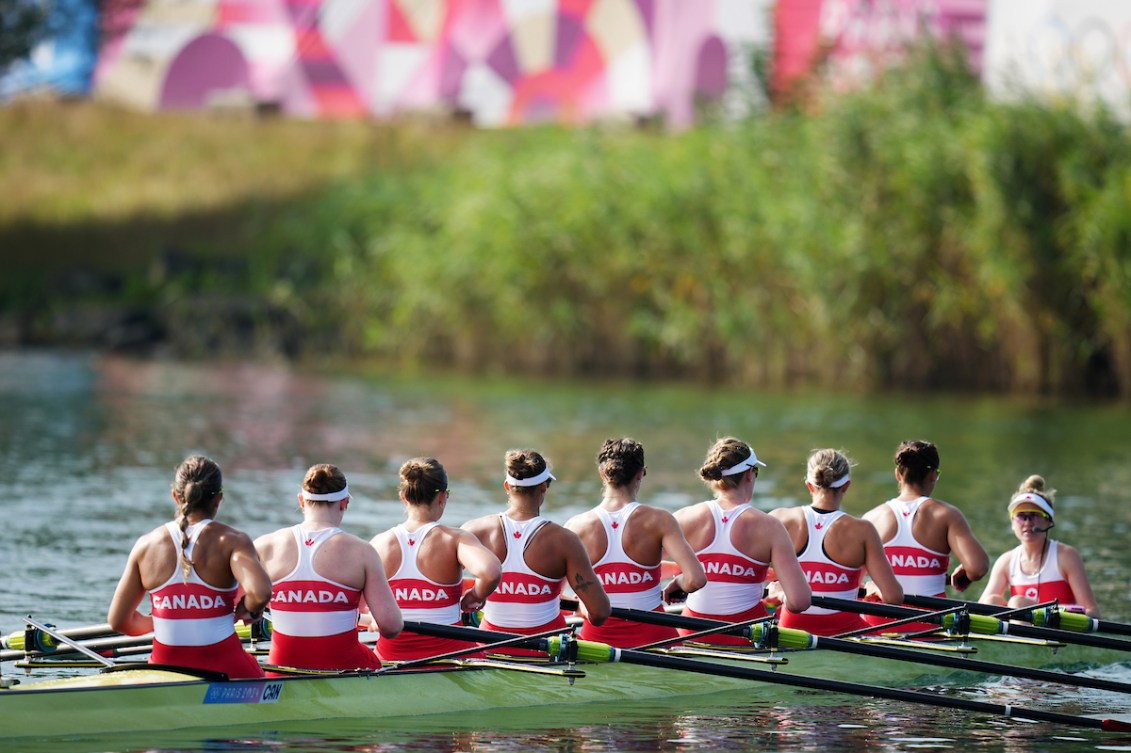
To repechage or not to repechage
Team Canada’s journey began in the heats at Stade Nautique de Vaires-Sur-Marne, facing tough opponents including the likes of Great Britain, who won the heat in 6:16.20, and Australia, who finished second in 6:18.61. Team Canada finished third, with a time of 6:21.31, and would need to route through the repechage to get to the final.
“We, as a Canadian women’s program, whether it’s a small boat or big boat, unfortunately have a bit of a history of being a little too slow in the heats,” Payne admitted sheepishly. “No one really knows how we’re going to break this spell. We keep trying, but it keeps happening that we have a mediocre heat, and then we have to light it up in the rep[echage] to make sure that we’re okay to go to the final.”
But Canada also has a history of lighting it up in the final, despite doing some extra racing along the way. The Tokyo 2020 women’s eight raced the repechage en route to their gold medal, proving that a bit of extra racing didn’t slow them down.
Payne is of the opinion that a journey through the repechage is not inherently bad, as it’s another opportunity to get a race under the team’s belt, to practice strategy, and to work through any issues. In Paris, the team identified the need to work on being faster off the start, and the repechage offered the opportunity to practice that.
But some on the team are more eager to break the curse of the repechage and avoid the extra physical effort en route to the final.
“Some of the girls took some confidence from [the similarity of the team’s path through the repechage to that of Tokyo 2020]…I’m not a fan of it,” Filmer said with a laugh.
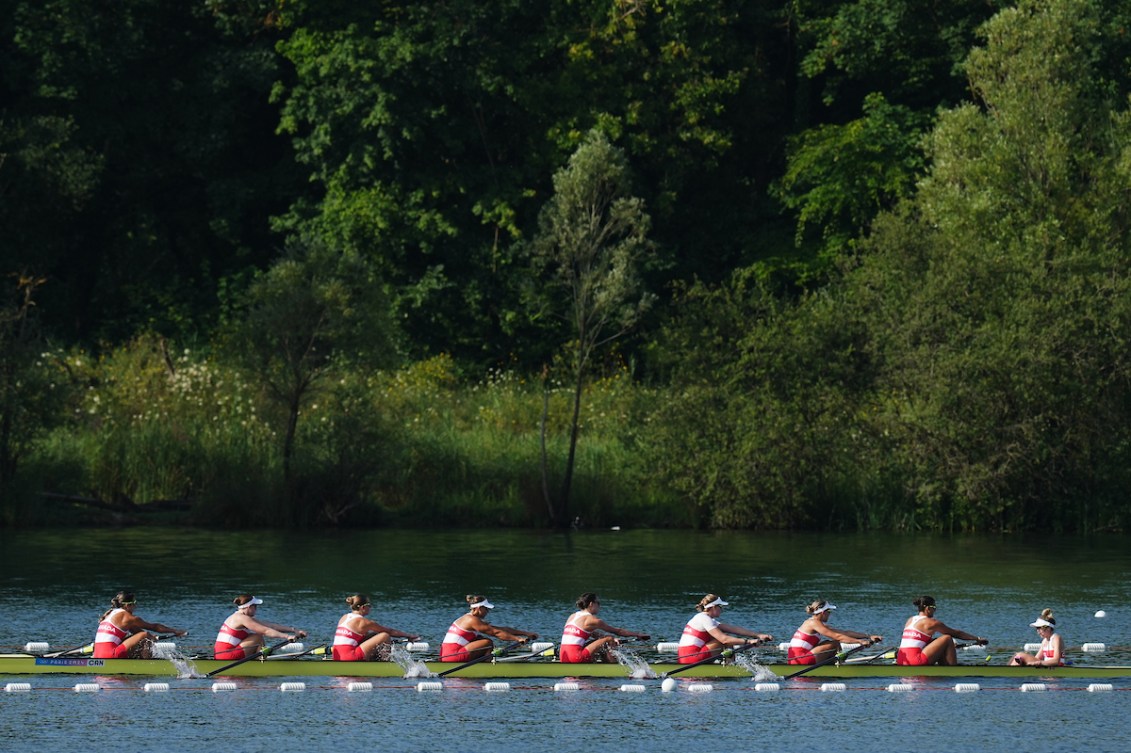
And her opinion carried weight with the team, as one of the most experienced athletes in the boat. Filmer raced in the women’s eight at Rio 2016 that placed fifth, taking the stroke seat at only 20 years old. She considered her bronze medal with Janssens in Tokyo as her storybook ending in the sport of rowing and retired after those Games, choosing instead to focus on cycling.
“For two years, I didn’t touch an oar,” Filmer said.
But when she heard that the women’s eight had been struggling at a few World Rowing Cups, she was lured back onto the water.
That being said, there are definitely elements from her time spent road cycling that she brought back with her into the boat.
“When I was riding, I was in a role where I would work for our team leader in a domestique role, helping to support her. And so you never really got to see yourself doing well, but then you get to see your teammate doing well and she can only get there with the entire team doing their parts,” Filmer explained. “It’s very different, but also very similar to the eight, where everyone needs to do their roles.”
With a fast start as a priority, Team Canada led for most of their repechage, ultimately finishing second to a surging Team USA. The Canadians rowed to a time of 6:04.81, a significant improvement from the heat, and enough to send them to the Olympic final where they would face Romania, Great Britain, Australia, Italy, and the United States.
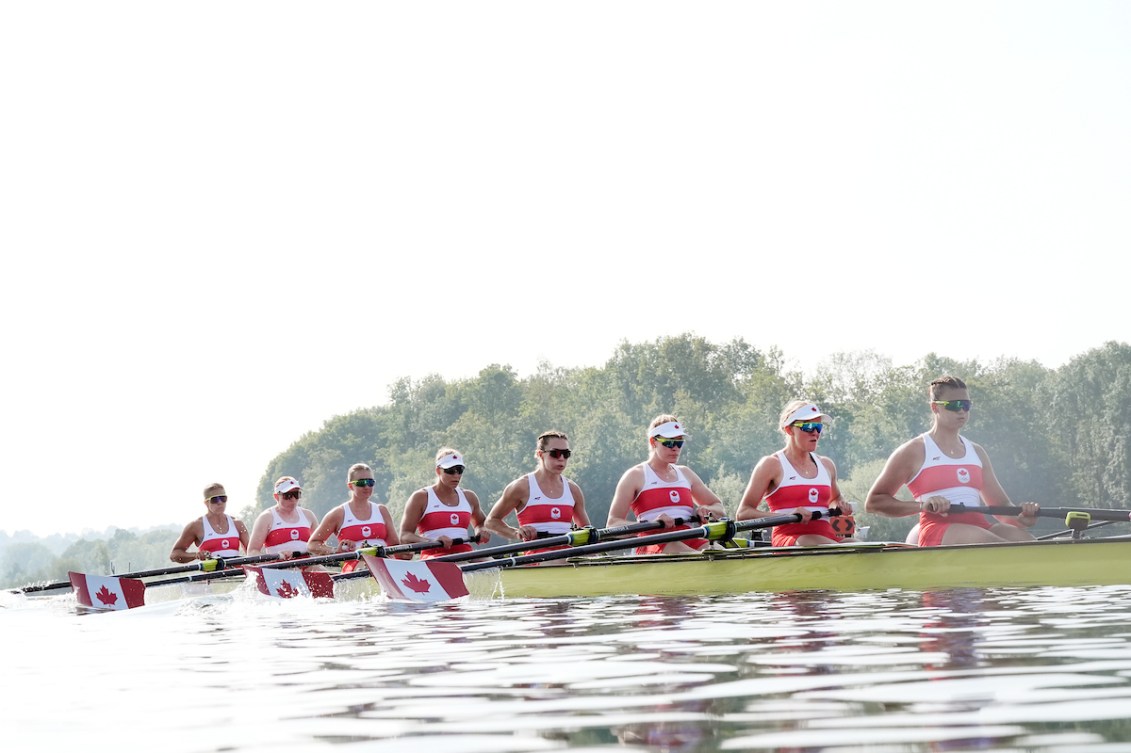
Controlling the controllables
As most athletes will tell you, on race day, it’s about controlling the controllables. The weather? Out of your hands. The other teams’ preparations? Nothing to do with you. What you have for breakfast? Your choice. How you style your hair? Completely up to you.
As such, doing each other’s hair has become a team ritual, a controllable they can control, and a low-key activity to do together. However, even hair is done with performance in mind.
“It’s more aerodynamic to have it pretty slicked back and in a low, not a high bun,” Filmer said.
The team also added a new and uber Canadian ritual to their pre-race routine: taking a group shot of maple syrup ahead of the final.
The shot was Walker’s idea and the syrup was tapped by her uncle. It succeeded in being a fun mood-booster ahead of the race, which Payne said can be really important.
“Anytime before a race when we can add something that’s a little bit silly or fun, I love it,” Payne said. “It’s just a way to loosen up, to smile, to laugh, and to remind us we’re doing this because we love it.”
Filmer has a similar attitude. When racing with Janssens, they would always say the same thing to each other right before the starting gun: “We love this.” Filmer kept that tradition at Paris 2024.

The Olympic final
Now was the time to go first with the head, and then with the heart.
Team Canada executed on that fast start that they had worked on in the repechage, reaching the 500m mark first, ever so slightly ahead of Romania.
Not that the athletes would know this, because Kit’s most consistent call to them, over and over, was: “Keep your head in the boat, keep your head in the boat.” There would be no sneaking glances at competitors, no double checking where they stood in the race—nothing mattered but their boat and their rhythm.
With a surge from the Romanians, Team Canada passed through the midway mark in second, but with a hard-charging Team GB chasing them down.
At 500m to go, Kit yelled at the crew the same thing she yelled at Tokyo 2020, a simple, but very motivating question: “What colour medal do you want?”
Despite each athlete saying they blacked out for portions of the race, that question still somehow made it through.
“I’m getting full body goosebumps just thinking about it now,” said Meschkuleit. “I think it helped us find another gear.”
At 250m to go, the buoys on the water switch to the colour red, which sparks the ominous phrase, “red means dead,” as crews are reaching their absolute limits. Romania had pulled away, but Canada needed to hold off Great Britain.
As they crossed the finish line, Payne looked up to the screen for the result; it showed Romania in first, but nothing else.
“There was this long pause that I hadn’t felt in Tokyo. I was like ‘What happened? Where are we? What is going on?’”
And then the rest of the podium flashed on the screen—Canada in silver, Great Britain with bronze.
All Payne could think then was: We did it. We did it. We did it.
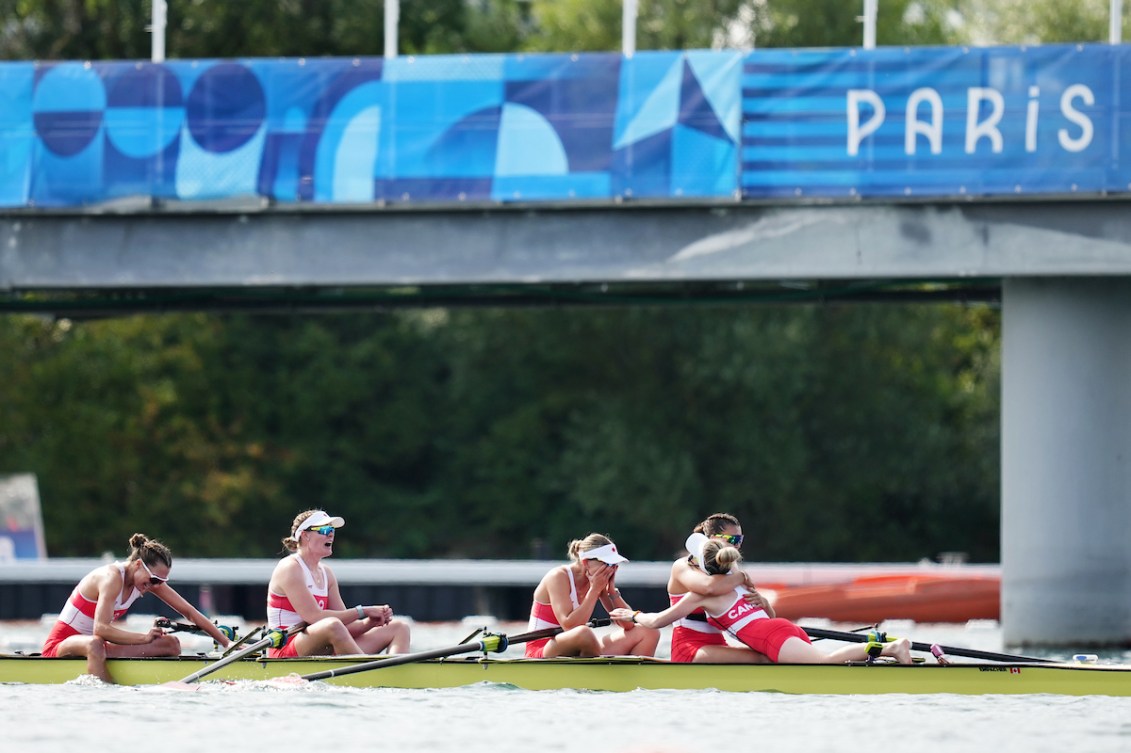
Meschkuleit was slightly distracted at the finish by her two teammates behind her—Filmer and Sevick in the bow seat—passing out from the sheer effort of the race. Excitement was tinged with concern as the medical boat headed towards them.
“I don’t remember anything in the second half of the race,” said Filmer. She’s seen photos and video of the team crossing the line.
“Everyone is cheering and has their hands up, and they’re all hugging each other. And then the medical boats are coming up because Jess and I are fully collapsed in the bow.
“But that’s an eights race,” she added with a chuckle.
The celebration
After returning to shore, there was media, and the victory ceremony. While nine athletes stood on the podium for Team Canada, Payne is emphatic that their Olympic success was the result of a group of eleven, which included their two alternate athletes, Kristen Siermachesky and Cassidy Deane.
“Our story is the collective contribution of all eleven people,” she said.
And then, finally, there was the chance to celebrate with family and friends. It had been decided that the rowing team would isolate ahead of their events, so the athletes had not yet seen their supporters in Paris.
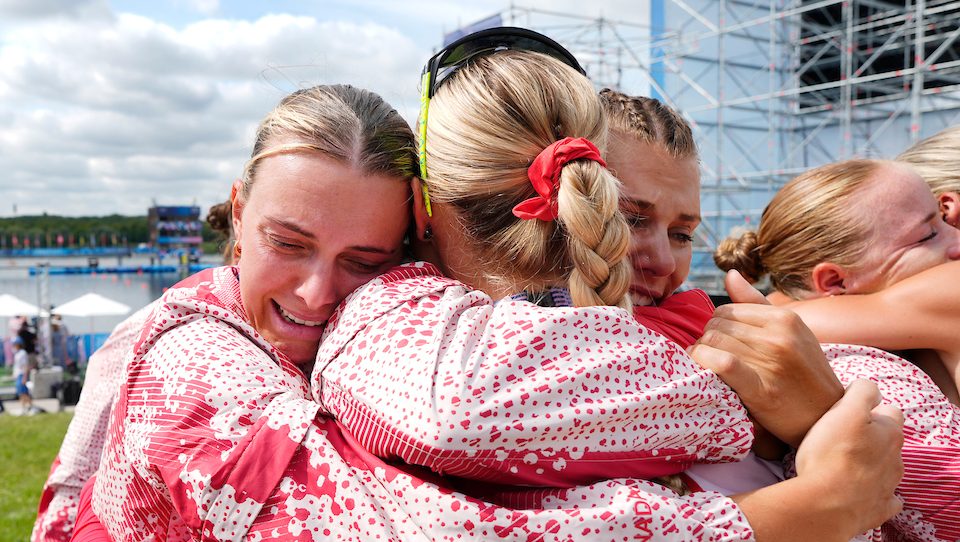
“It was very emotional, not just seeing your own family, but seeing all your teammates with their families, and everybody getting to celebrate and support each other,” said Payne. “We didn’t get to experience that in Tokyo, so that was a really, really special moment.”
For Meschkuleit, it marked the achievement of a childhood goal she jotted down after meeting Christine Sinclair—to represent Canada at the Olympic Games.
“Being able to have that full circle moment of this goal sheet I had written when I was 13, and now 10 years later I’m on the podium at the Olympics…honestly, it still doesn’t feel real,” she said.
To the future
Now with back-to-back podiums, Canada has again established itself as a powerhouse in the women’s eight—regardless of how they may progress through the regatta—and will be a force to be reckoned with in Los Angeles.
And they’ll navigate their journey to LA 2028 their own way—first with the head, and then with the heart.

